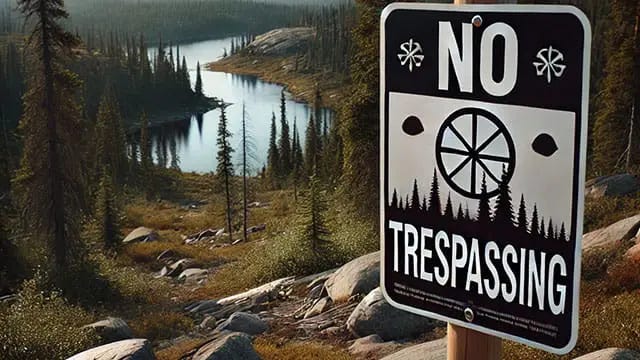Below is the eleventh of several outstanding opinion pieces about Indigenous land claim issues in British Columbia that will be posted without a paywall over the next few weeks.
All are written by Geoffrey S. Moyse, K.C., a retired senior lawyer who served as legal counsel to the Province of B.C., advising six successive governments on Aboriginal law matters over more than 30 years.
His writings rebut the current NDP provincial government's indigenous land ownership and use policies.
The issues Moyse describes are relevant to similar land claim matters across Canada. Still, they are currently in overdrive in B.C. as the province faces a crucial provincial election on October 19, seven short days from now.
With the recent implosion of the B.C. United Party (formerly the Liberal Party of B.C.), a change in government from the B.C. NDP to the B.C. Conservative Party is possible.
The NDP strongly champions the indigenous issues discussed by Moyse, while the Conservative Party opposes them just as forcefully.
Only time will tell whether this opposition will translate into far-reaching legislative and regulatory changes and whether these will resonate elsewhere in the country.
Remember those recently proposed amendments to the B.C. Land Act?
Geoffrey Moyse
Troy Media
September 4, 2024
Rest assured, they will be back if the B.C. NDP is re-elected
Not too long ago, the BC NDP tried to introduce amendments to the B.C. Land Act that stirred significant public opposition. To remind you of the issue, here’s a key point from a commentary by a senior legal counsel at McMillan LLP:
“Under the proposed amendments by the B.C. government, agreements with Indigenous groups would give them veto power over decision-making regarding Crown land tenures and/or joint decision-making authority with the Minister. In such cases, the Crown would no longer have the sole authority to make decisions about Crown land in the public interest.”
Understandably, there was significant public backlash to these proposed changes in how decisions about B.C.’s Crown (public) lands would be made in the future.
But let’s step back and examine the source of these proposed amendments.
In previous writings, I discussed DRIPA – the province’s Declaration on the Rights of Indigenous Peoples Act – which was passed unanimously in 2019.
Section 7 of DRIPA states:
“For the purposes of reconciliation, the Lieutenant Governor in Council may authorize a member of the Executive Council, on behalf of the government, to negotiate and enter into an agreement with an Indigenous governing body relating to one or both of the following:
The exercise of a statutory power of decision jointly by the Indigenous governing body and the government or another decision-maker;
The consent of the Indigenous governing body before the exercise of a statutory power of decision.”
In simple terms, Section 7 authorizes the B.C. government to enter into agreements with Indigenous governing bodies, allowing decisions about the use of Crown land to be made jointly or requiring the consent of Indigenous groups before any decisions are made.
It’s important to note that, like the recent Haida title recognition legislation, DRIPA may be unconstitutional for singling out Indigenous groups under the 1867 Constitution Act. I understand a constitutional challenge has already been filed.
So, what’s the real origin of Section 7?
Article 18 of UNDRIP (U.N. Declaration on the Rights of Indigenous Peoples) states: “Indigenous peoples have the right to participate in decision-making in matters which would affect their rights, through representatives chosen by themselves in accordance with their own procedures.”
But what does “participate in decision-making” mean? UNDRIP’s language is vague and open to interpretation.
This phrase could be understood as either a right to joint decision-making or the right to be fully and meaningfully consulted before government decisions that affect Indigenous rights are made. The latter interpretation aligns with the 2004 Haida decision by the Supreme Court of Canada.
However, B.C.’s current government has chosen to interpret this as a right to joint decision-making, which is inconsistent with Canadian case law.
What about Indigenous consent before government decisions can proceed, as outlined in Section 7 of DRIPA? Article 32(2) of UNDRIP states: “States shall consult and co-operate in good faith with the indigenous peoples concerned through their own representative institutions in order to obtain their free and informed consent prior to the approval of any project affecting their lands or territories and other resources.”
This, again, is inconsistent with Canadian constitutional case law. The Supreme Court of Canada has not made such a ruling.
So, what’s the bottom line?
The B.C. The NDP government has chosen to prioritize UNDRIP over Canadian constitutional law in several aspects of DRIPA. This is why the B.C. Land Act amendments were proposed, and it is also why we can expect these amendments to be reintroduced if the government is re-elected.
For this government, UNDRIP seems to take precedence over Canada’s constitutional framework.
Geoffrey S. Moyse KC is a retired senior lawyer who served as legal counsel to the Province of B.C., advising six successive governments on Aboriginal law over more than 30 years.




Perfectly concluded piece: “UNDRIP seems to take precedence over Canada’s constitutional framework.”
Why is this not a central election issue? This will have a hugely negative impact on our province and few voters even know about it! The rights of a handful of self-serving peoples would have equal power as the millions of the rest of us. As equal partners, they would gain the ability to veto projects heretofore made in the public good. Allowing this to pass would be catastrophic for our province and gives one monumental reason (among many others) to vote the NDP out!